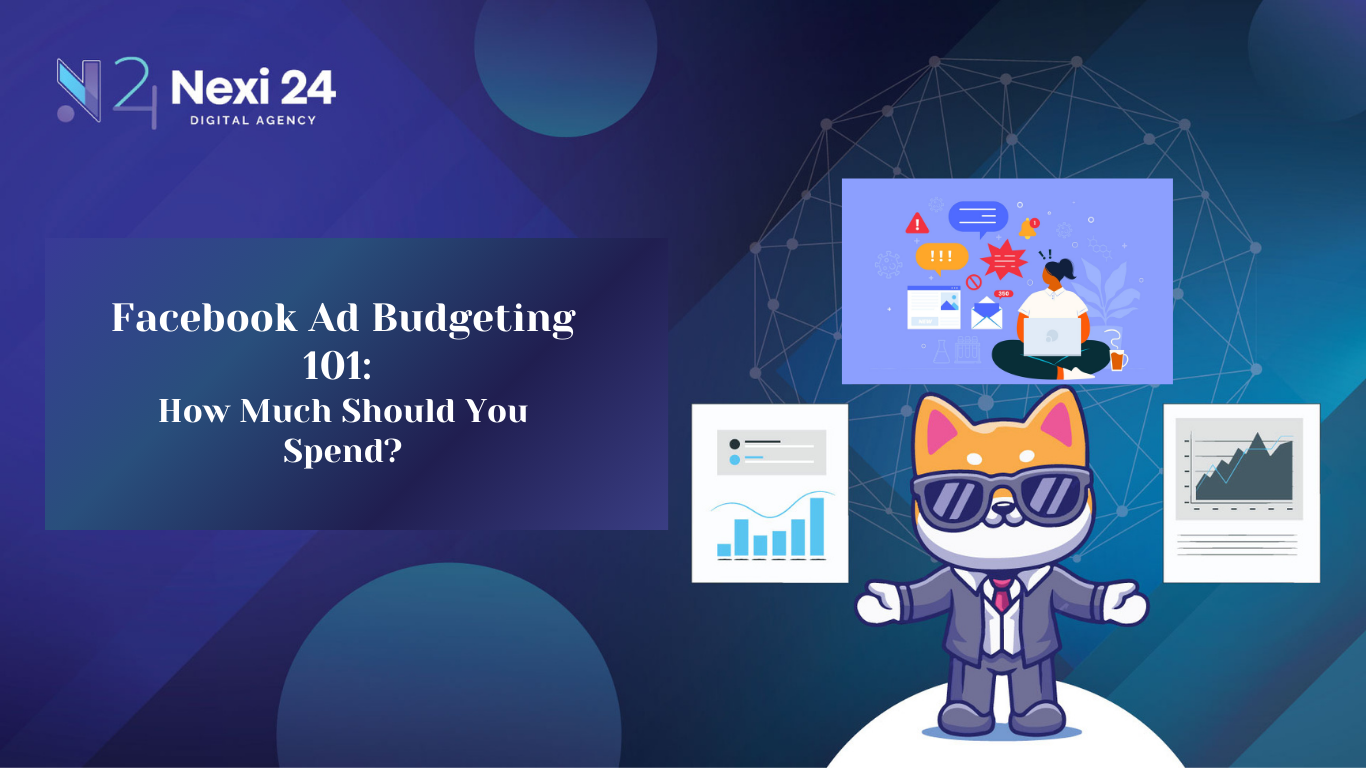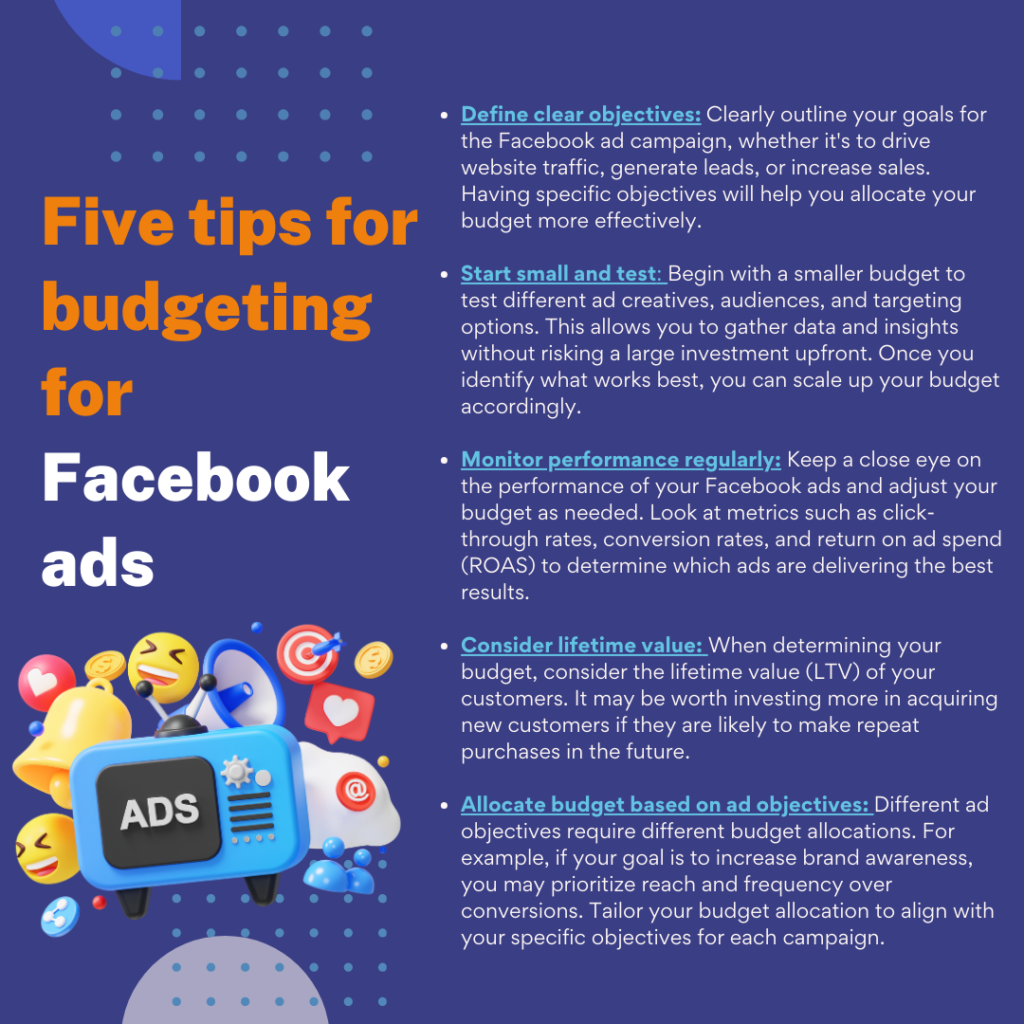Facebook Ad Budgeting 101: How Much Should You Spend?

When it comes to advertising on Facebook, determining the right budget is crucial for the success of your campaigns. Whether you’re a small business owner or managing ads for a larger company, setting an appropriate budget can maximize your return on investment (ROI) and ensure your marketing dollars are well spent. Here’s a comprehensive guide to help you figure out how much you should spend on your Facebook ad campaigns based on your business goals and resources.
Understanding Your Business Goals
The first step in determining your Facebook ad budget is to clearly define your business goals. Different goals will require different levels of investment. Here are some common objectives and how they might impact your budgeting:
- Brand Awareness: If your goal is to increase brand awareness, you might need a larger budget to reach a broad audience. Brand awareness campaigns often involve higher reach and frequency, which can drive up costs.
- Lead Generation: For campaigns focused on generating leads, you’ll need to budget for both the cost per click (CPC) and the cost per lead (CPL). The more competitive your industry, the higher these costs might be.
- Sales and Conversions: If your objective is direct sales or conversions, you’ll need to consider your cost per acquisition (CPA). Your budget should be sufficient to generate a high enough volume of conversions to justify the spend.
- App Installs or Engagement: For app-related goals, you’ll need to consider the cost per install or engagement rate. This can vary widely based on the target audience and the type of app.
Factors Influencing Your Facebook Ad Budget
Several factors influence how much you should spend on Facebook ads. Here are the most critical ones to consider:
1. Industry Benchmarks
Different industries have different average costs for Facebook ads. Researching your industry’s benchmarks can provide a useful starting point. For instance, the average CPC for the technology industry might be higher than that for the fashion industry.
2. Audience Size and Targeting
The size and specificity of your target audience will also affect your budget. Broad targeting typically costs less per impression but might result in lower engagement rates. Narrow, highly targeted audiences can be more expensive but often yield higher engagement and conversion rates.
3. Ad Placement
Facebook offers various ad placements, including the News Feed, Stories, Marketplace, and more. Each placement comes with its own cost structure. It’s important to test different placements to see which ones provide the best results for your goals.
4. Campaign Duration
The length of your campaign will influence your total budget. A longer campaign will require a higher overall budget, but it might also provide more data and better optimization over time.
5. Ad Quality and Relevance
Facebook rewards high-quality, relevant ads with lower costs and better placement. Investing in high-quality creative and ensuring your ads are highly relevant to your audience can help reduce costs.
Before setting your budget, it’s also important to be aware of common pitfalls. Check out the Top 10 Facebook Advertising Mistakes to Avoid to ensure your campaign is on the right track.
Setting Your Facebook Ad Budget
Once you’ve considered your goals and the factors influencing your budget, it’s time to set a specific amount. Here are some strategies to help you decide:
1. Daily vs. Lifetime Budgets
Facebook allows you to choose between a daily budget and a lifetime budget. A daily budget caps your spending per day, which is useful for consistent spending over a period. A lifetime budget spreads your total spend over the duration of your campaign, which can be useful for promotions or events with a fixed timeframe.
2. Start Small and Scale
If you’re new to Facebook ad budgeting or unsure about the right budget, start with a smaller amount. Monitor the performance closely and scale up as you gather data and see positive results. This approach minimizes risk and allows for adjustments based on real-world performance.
3. Utilize Facebook’s Recommendations
Facebook provides budget recommendations based on your campaign settings and objectives. These recommendations can serve as a useful guide, especially for beginners.
4. Calculate Based on Desired Outcomes
Work backwards from your desired outcomes. For example, if you know your average sale is worth $50 and your target CPA is $10, you can estimate how much you need to spend to achieve your sales goals.
Monitoring and Adjusting Your Facebook Ad Budget
Setting your budget is not a one-time task. It requires ongoing monitoring and adjustment. Use Facebook’s analytics tools to track performance and adjust your spending based on what’s working. If a campaign is performing well, consider increasing the budget. Conversely, if a campaign is underperforming, analyze the data to understand why and make necessary adjustments.

Conclusion
Determining your Facebook ad budget is a critical step in ensuring the success of your advertising campaigns. By understanding your business goals, considering key factors, and setting a budget that aligns with your objectives, you can maximize your ROI and achieve your desired outcomes. Start with a clear plan, monitor your results, and be prepared to adjust as needed to optimize your ad spend.
Determining your Facebook ad budget is a critical step in ensuring the success of your advertising campaigns. By understanding your business goals, considering key factors, and setting a budget that aligns with your objectives, you can maximize your ROI and achieve your desired outcomes. Start with a clear plan, monitor your results, and be prepared to adjust as needed to optimize your ad spend.
Additionally, leveraging advanced budgeting strategies such as A/B testing, using custom and lookalike audiences, and dynamic ads can further enhance the effectiveness of your campaigns. Regular performance reviews and staying updated with Facebook’s latest features and policies are also essential to maintain and improve your ad performance. By continuously monitoring and fine-tuning your approach, you can ensure that your Facebook advertising remains a valuable and profitable investment for your business.

